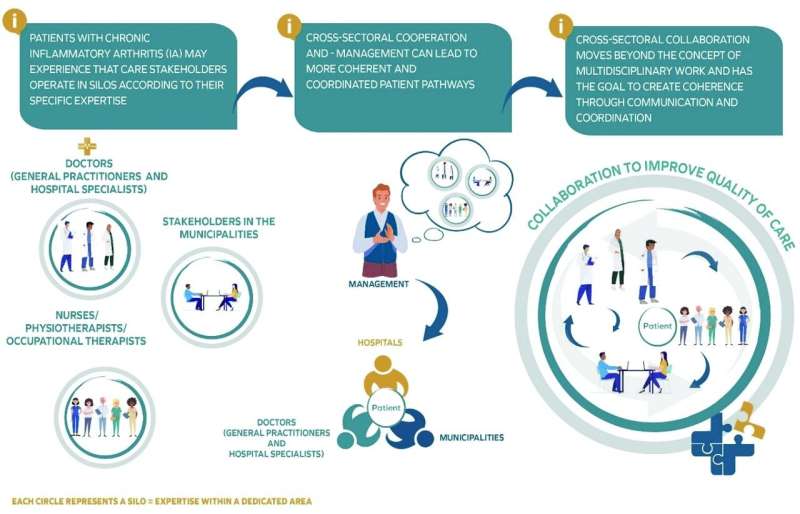This article has been reviewed according to Science X's editorial process and policies. Editors have highlighted the following attributes while ensuring the content's credibility:
fact-checked
proofread
Encouraging cooperation in inflammatory arthritis

There is a need to improve cross-sectoral care for people with inflammatory arthritis. The Danish Centre for Expertise in Rheumatology (CeViG) at the Danish Hospital for Rheumatic Diseases in Sønderborg, Denmark, is a unique institution—which aims to share knowledge with people involved in the care and management of inflammatory arthritis.
EULAR—The European Alliance of Associations for Rheumatology—supports innovations in health care for arthritis. Now, new survey data presented at the 2024 EULAR congress showcase the benefits of cooperation between different stakeholders.
Inflammatory arthritis describes a group of diseases caused by an overactive immune system. The different types of inflammatory arthritis include rheumatoid arthritis, psoriatic arthritis, juvenile idiopathic arthritis, and ankylosing spondylitis.
The most common symptoms are joint pain and stiffness. Pain is the predominant symptom in the majority of people with inflammatory arthritis, which contributes to the global burden of rheumatic and musculoskeletal conditions. Knowledgeable support can reduce pain, increase functioning and well-being, and reduce individual and societal costs.
Co-creation is a collaborative development strategy where stakeholders from different backgrounds or sectors work together to jointly produce a mutually valued outcome. Cross-sectoral cooperation in health care systems involves collaboration among various sectors—public, private, and non-profit—to address health-related issues in a comprehensive and effective manner.
Cross-sectoral cooperation is vital in the management of people living with inflammatory arthritis because it enables integrated care approaches that enhance patient outcomes by combining expertise from various health care and support services. Cross-sectoral cooperation can lead to innovative treatments and more coherent and coordinated patient pathways, ultimately improving quality of life for patients with this chronic condition.
To explore and facilitate cross sectoral collaboration, a 1-day seminar was held to bring together a group of 53 stakeholders with different backgrounds and interests, including multidisciplinary health care professionals and general practitioners, municipal representatives, politicians, public leaders, and patient research partners. The aim was to inspire dialogue on how management across these different sectors can improve and develop health care for people with an inflammatory arthritis.
The meeting delivered state-of-the art updates about the latest research on co-creation, public governance, cross-sectoral management, and relational capacity. After the seminar, a survey captured feedback on how participants perceived the overall benefit from the seminar, and the degree to which their expectations were met.
Of 22 responses collected, 100% rated the outcomes of the seminar as "good" or "very good." 59% and 36% felt that the meeting met their expectations to a "high degree" or "very high degree," while 5% were neutral. There was a feeling that there is a pressing need to improve the cross-sectoral cooperation in order to manage the complexity of people with inflammatory arthritis, and that some of the ideas presented would be useful as a tool to improve communication and collaboration—both internally, and with external partners.
The authors feel that the seminar was successful in addressing the need to improve coherence across sectors. This is the first step in a continuous process, and future efforts will involve patients and other stakeholders from all parts of the health care system to improve the cross-sectoral cooperation.
More information: B. Fabricius Petersen et al, OP0318-PARE Improving cross-sectoral care for patients with inflammatory arthritis: Results from a first seminar with cross-sectoral involvement, People with Arthritis and Rheumatism in Europe Abstracts (2024). DOI: 10.1136/annrheumdis-2024-eular.5801




















